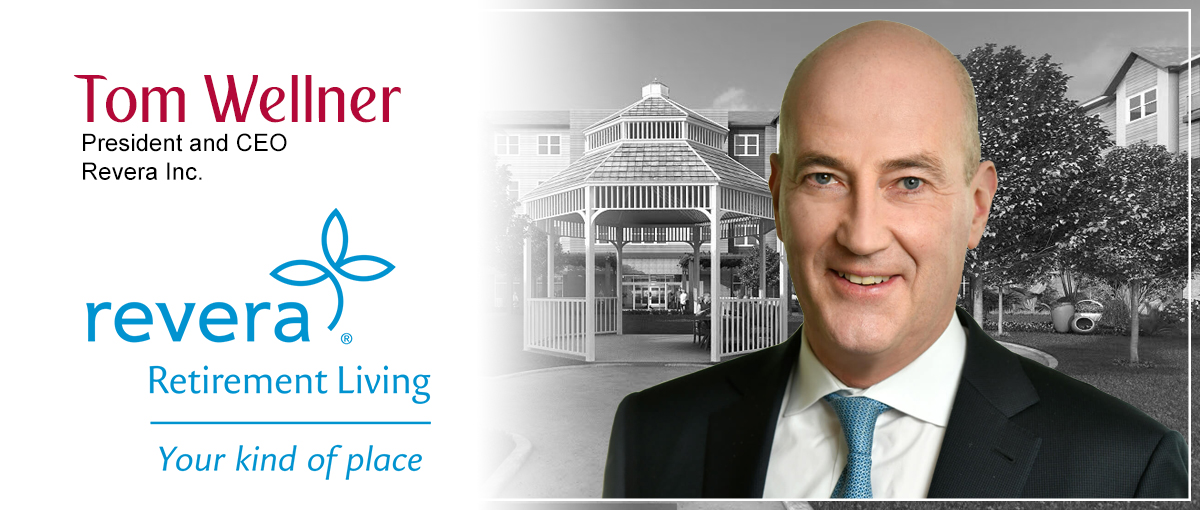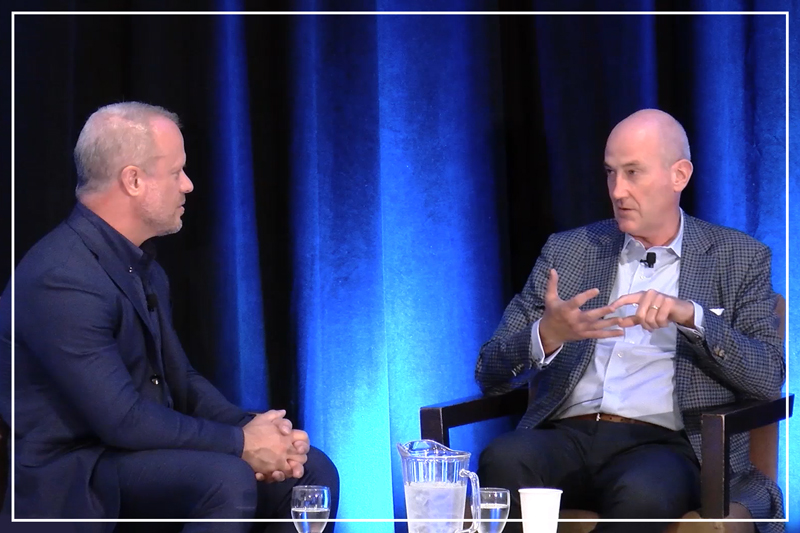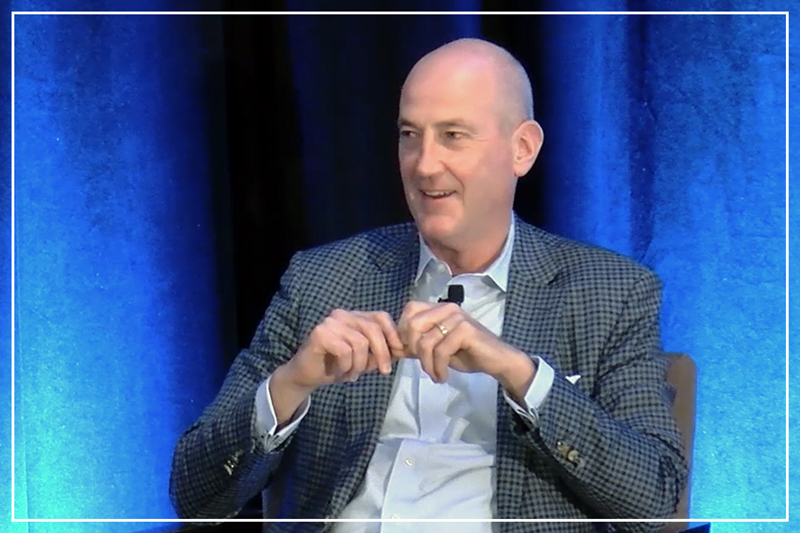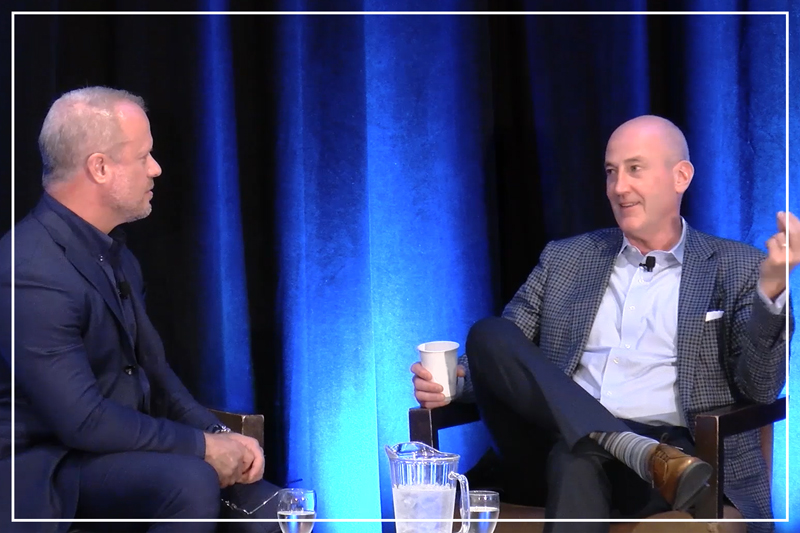Sponsored by



Meet Tom Wellner, President and CEO of Revera Inc. Since joining Revera in 2014, Wellner has led the organization through transformational changes, developing the company’s strategic direction to grow, innovate and lead in the sector.
Over the past five years, Wellner has worked with numerous strategic partners in Canada, the U.S. and the U.K. to grow Revera’s portfolio to more than 500 properties internationally.
As part of the ORCACON 2019 program, Keynote Speaker David Allison sat down with Wellner to discuss leadership through corporate culture, innovation and the importance of effective communication in the workplace.
Conversation with Tom Wellner
Note: This interview transcript has been edited for content and length.
ORCA: We’re here to talk about leadership, but questions around anything are always best if there’s context. So, we want to go way back to the beginning and ask you, what was your first job?
TOM WELLNER:
I got my first real job when I was 14. I worked for a hotel called “Rodd Charlottetown”; where I started at the front desk, then worked as a line cook, and shortly after that was a bus boy.
ORCA: Well these days in the leadership world, we’re all talking about servant leadership. So, you started in service right at the beginning. Now, looking back from where you are today, do you see any commonalities or themes that have emerged throughout your career?
TOM WELLNER:
Well, I’ve always been much more of a generalist than a specialist. The first 20 years of my career was with Eli Lilly and Company, but my roles were mostly in general management, marketing, sales, and other people functions.
But to your question, throughout my career a few common themes have emerged. For starters, I’ve always worked and had experiences in large, people-oriented organizations. The second theme would be regulated businesses. Nearly all my senior roles have had to deal with challenging regulatory environments and protocols. And lastly, I have always worked and enjoyed operating in complex situations.
In fact, the main reason why I joined the Senior Living sector is because I love running complex businesses. I’ve had the privilege to run multiple public and private businesses that were exceedingly complex. My preferred business is one that – yes, make money for our shareholders – but also balances that obligation with being socially responsible.
ORCA: So it’s the complexity and the social responsibility of this sector that gets your blood running?
TOM WELLNER:
Yes. My first exposure to the Senior Living sector was when I lived in the U.K. and I was working in healthcare and pharmaceuticals. I drove by Sunrise Senior Living in Virginia Water, just outside of London, and I still remember driving by and saying, “oh, that’s kind of interesting”. Admittedly, I didn’t really know what seniors housing was all about, and that precipitated a little bit of learning on my part.
From there, I got connected with Revera. Our owner, the Public Sector Pension Investment Board (PSPIB), has a very strong, socially orientated investing profile. The way our board approaches things, and the way I try to approach things as a leader, is to strike a balance between generating economic success and doing things that are socially responsible. As an organization, if we can run a profitable business and accomplish good things that enhance the process of aging, we’ll all benefit.
As an example, at Revera we’ve been investing in entrepreneurs and innovation. Recently, I convinced Revera’s Board to allow us flexibility for an innovation fund. Through that fund we’ve been able to help fund entrepreneurs across Ontario and Canada. We’ve hired a Chief Medical Officer – which is a fantastic role, that we’re very proud of but this is a role we would not necessarily be able to have if the organization was only concerned with the bottom line. We’ve also brought on a Chief Elder Officer, Hazel McCallion (our other CEO) to champion the needs of older adults and ensure we are innovating to meet their needs. We also maintain a great relationship and a fundraising focus with Habitat for Humanity. All these things, we’re only able to do because as an organization we are committed to being socially oriented.

ORCA: So, in the people, regulation, complexity business, what kind of change have you seen around those themes, and how are they different today compared to when you started?
TOM WELLNER:
I think the biggest difference is speed, and certainly the emergence of social media.
I think back to my early days when I was working overseas. I’d arrive at my hotel and I would have to remove the caps on the internet cord to plug it into my computer, because even email was a new thing. Fast forward to today and with the speed at which the residents, staff, and our teams communicate, you get instantaneous feedback on what’s going on – you get the good, the bad and the ugly. Our ability to respond in an instant is very different today.
ORCA: And what do you think about that? Where’s the space to think as a leader?
TOM WELLNER:
I think for leaders, no matter where we’re leading and what we’re doing, finding time to self-reflect, slow things down, and take a breath is important. Personally, I do that when I run in the morning. I also spend a fair bit of time on airplanes, so I use that time to slow things down. I find that to be quite a cathartic experience, surprisingly enough.
At Revera, we try to simplify the processes through which we support the residents and our communities. When I go to visit residences, I make sure that I take time to talk with the team and sit down with the executive director. We sit together and talk about “how the staffing modules are working?”, “how is our intranet, MyRevera, working?”, “what’s not working?”, so I can understand the issues and pass that information to our teams that are working to develop solutions. Solutions we hope are simple, understandable, and useful to the front-line staff. I am, at times, humbled by the difference between how I think things are happening, compared to how things are happening in reality. I think a lot of that is due to the speed of communication and technology that we all deal with across our lives.
ORCA: It’s fascinating that you’re going to the extent of talking with the front-line folks, one on one, sitting down to really understand what you’re hearing in your leadership position.
TOM WELLNER:
I think as leaders, one of the key things we all need to do is create environments and cultures. I strive to make sure that we have a very open culture; that I, as a leader, am open to opinions that may be different than my own, because I’m a lifelong learner and I don’t have all the answers.
First off, I came into the sector through my own experiences, so I am learning certain parts of the business as I go. But I think that if you can create an environment as a leader where you can be open and inclusive of different perspectives, you will end up making better decisions.
Secondly, as I mentioned, we’ve been very active at Revera with our innovation initiative. The innovation initiative is not about technology, and it’s not about investments. For me, it’s about cultural change and empowerment. It’s about empowerment of the front-line staff to be able to feel safe and to be able to create ideas and ways that we can do things differently. If you set that up as a leader, I think it helps sort through some of the complexity that we all deal with in this sector.
ORCA: So, it comes back to being a people business at the end of the day.
TOM WELLNER:
Absolutely, senior living is a people serving people business.
Everyone comes into the sector from different routes. You have people who see the sector as an opportunity to extend their building and construction teams; some people are running a single residence and then expanding that, or others are coming through hospitality, or a hospital setting. But at the end of the day, when we talk to investors interested in our business, we are sharing the senior living experience as one of the highest operationally sensitive businesses that are out there. So, if you are a capital provider in the sector and you’re looking at the senior living sector versus other options such as self-storage or warehouse, those are very low “people-required” businesses. Whereas our business is very much dependent on people. The structure, location, and the physicality of our residences is very important; but the most important thing is the people and how the culture within the organization is established and maintained – which, not surprisingly, is also done by people.
ORCA: If you had to wrap up all the years of experience you’ve had in this people serving people business, give us your big take-away lessons that everybody should keep in mind as they work to further their own careers.
TOM WELLNER:
Early on you learn that communication is critical.
I encourage everyone to really check for true understanding while communicating. As your career progresses, the nature of communication changes; you go from communicating with yourself, then you communicate one-on-one, then you communicate through other people, and then you have to communicate through layers of other people, and finally you communicate through action and influence, through things like corporate culture. Whatever the case, slow down and check for true receipt and understanding of what you mean. I find in many cases, success can be attributed to effective communication and understanding. To achieve that you must listen and truly acknowledge that there is comprehension of what you’re trying to accomplish.
Another leadership lesson I would offer is to be humble. As a leader, I don’t come with all the answers; but I work with groups where my role is to enable good insights and lever the group’s expertise. In those situations, I feel most positive and I think you get the best decisions.
My third take away would be, not everything is black and white. I think we all oscillate between the analytical side of our brains and the non-analytical side, but I’ve learned the best decisions combine both. The key thing when making decisions is to consider what factors inform our assumptions and what does the data tell us, but also what’s around the data that isn’t fully understood. If you can tease that out – again, I go back to that comment about getting alternative views and encouraging an open approach in your culture – then you’ll end up with a strong decision.
ORCA: So with that advice in mind, how do you approach the development of future leaders?
TOM WELLNER:
When it comes to developing some of our top talent, we engage in full scale succession planning and talent development exercises. In fact, next week we’re sending a group from our team to a special educational program for further development. But what we’re really trying to do is help people fully develop their leadership capacity. We give them challenges, give them both in-job challenges and provide constant feedback – formal and informal. We’re all developing skills. I have certain skills that I feel most comfortable with; I have other skills where I require more learning, or I require a lot of energy to be able to do them.

ORCA: There’s a constant stream of reading and study that you can do just around the subject of leadership. How to be a good leader, it’s not like there’s a lack of information out there.
TOM WELLNER:
True. One of my key things is the recognition that we all struggle sometimes. I’d say, it’s okay to take risks. We all have those times when you know the answer, you know that something is possible, but the fear of stepping forward is holding you back. If you don’t step forward, and I’ve had this myself, you’re always going to have the regret. You live longer with the regret of not having taken the opportunity or taken the advantage.
In terms of education, I think you must manage your own leadership profile and your own personal growth, because it’s a very personal thing. At Revera, we try to create the environment to allow our people to do that. Sometimes we have the experiences packaged and ready to go, sometimes we don’t. We will help support folks where we can, but you must be self-directed.
It’s the same thing for me when I work with our Board. There’s certain things they tell me I need to focus my energies on, and then there are times where I’m going to them and saying “I’d like to take on a board position with this private company, because I haven’t experienced that before and I think it would be valuable”. As an example, our Board recently supported me to do the Institute of Corporate Directors (ICD) course, because I participate on a number of Boards.
ORCA: So, you’re still at school?
TOM WELLNER:
All the time. I’ll be at school until they start laying the sod over top of me or they’re scattering the ashes at the end of the dock.
ORCA: As we close, two quick questions. First one, if you had a do-over, what would it be? And secondly, when you’re gone, and people talk about that guy who used to be the CEO, what do you hope they say?
TOM WELLNER:
To answer your first question, I don’t have any regrets. I wouldn’t re-do anything. Life happens the way it happens, and I try not to look backwards. I only look forwards. I learn along the way, but there’s no singular event or instance that I would focus on.
And to your second question, I hope people remember that I encouraged a thoughtful approach to the sector. I hope that people will remember that I enabled opportunities to be innovative and to openly communicate.

ORCA: That’s the guy who helped me get here?
TOM WELLNER:
Yeah. I get great value out of mentoring, formally and informally. I get great value seeing talented folks pursue different routes, and if I get a chance to interact with them and have a relationship for a period of time and they can go on to further success, that gives me great satisfaction.
ORCA: That was a great chat, thank you for your time.
TOM WELLNER:
My pleasure. Thanks a lot.
Dynamic. Smart. Energetic. Committed.
Leaders in Ontario’s retirement communities sector are changing the way the world thinks about senior living.
Join ORCA as we speak to the premier leaders in the sector today – about who they are, why they are here and where we are going.
Sponsored by:
